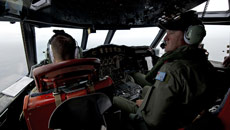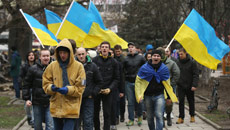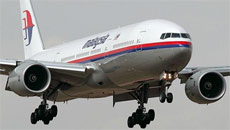Flying in to Kathmandu, Prime Minister Narendra Modi said he wanted to forge a "new relationship" with Nepal that could serve as a model for regional partnership in South Asia. After his two-day visit, it is apparent he has succeeded to a large extent and opened in his own words a "new chapter" in ties with the Himalayan republic.
Modi connected well at the popular level and engaged the political leadership, holding talks not just with his counterpart Sushil Koirala but with the broad spectrum of leaders across the political divide in the country that is still struggling to establish constitutional democracy.
He unequivocally said India will respect Nepal's sovereignty and would not interfere in its internal affairs, an accusation made especially by the Maoists. He also made it amply clear that India is all for revising and updating the 1950 Peace and Friendship Treaty, thereby taking the wind out of the sail of a large number of Nepali politicians who say it is tilted in favour of India.
At the same time, Modi extended India's helping hand in Nepal's socio-economic development. In what has become his trademark style, he offered to help Nepal through HIT, which stands for Highways, Information Technology and Transmission lines of power. "You decide what needs to be done, India will stand by you," he said magnanimously and offered Nepal $1 billion in concessional loans to help build power plants and roads.
Modi had identified steps to strengthen bilateral cooperation in key sectors, including trade and investment, hydropower and tourism. At the official level talks, the Indian side said the problem of trade deficit could be best bridged by development of hydropower in Nepal and export of surplus power to India. To improve connectivity, both sides agreed to expedite the works related to the development of cross border transmission lines as agreed in the Joint Commission meeting last month and to consider cross border direct routes to facilitate direct flights between regional airports Pokhara-Bhirahawa-Lucknow.
Modi's trip to Nepal--the first bilateral visit by an Indian prime minister in 17 years--is part of his government's efforts to re-engage with immediate neighbours, a policy that is crucial to India's renewed search for economic growth and national security. For his swearing-in ceremony in May, Modi invited the heads of neighboring governments, including the Nepalese prime minister. His first overseas trip as prime minister was to Bhutan. External Affairs Minister Sushma Swaraj had travelled to Nepal to chair the India-Nepal Joint Commission meeting that took place after a long gap of 23 years.
A section of the international media and some commentators have described the Modi administration's South Asia policy as one aimed at limiting the increasing footprint of China which has moved in to build ports in Sri Lanka and Bangladesh and power plants and roads in Nepal. Though China is a factor in the security and foreign policy calculations, the government's neighbourhood policy is more driven by domestic needs, such as spurring economic growth, and a vision of a more integrated South Asia.
Modi's trip underlined the importance of high level visits in adding momentum to bilateral ties and enhanced the focus of New Delhi on relations with neighbouring countries. More significantly, it reset ties with a strategic neighbour with meaningful dialogue at the political level as well as advancing sub-regional cooperation with development partnership.





